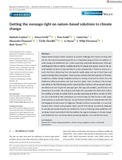| dc.contributor.author | Seddon, Nathalie | |
| dc.contributor.author | Smith, Alison | |
| dc.contributor.author | Smith, Pete | |
| dc.contributor.author | Key, Isabel | |
| dc.contributor.author | Chausson, Alexandre | |
| dc.contributor.author | Girardin, Cécile | |
| dc.contributor.author | House, Jo | |
| dc.contributor.author | Srivastava, Shilpi | |
| dc.contributor.author | Turner, Beth | |
| dc.date.accessioned | 2021-02-12T10:45:41Z | |
| dc.date.available | 2021-02-12T10:45:41Z | |
| dc.date.issued | 2021-02-01 | |
| dc.identifier.citation | Seddon, N.; Smith, A.; Smith, P.; Key, I.; Chausson, A.; Girardin, C.; House, J.; Srivastava, S. and Turner, B. (2021) Getting the Message Right on Nature‐based Solutions to Climate Change. Glob Change Biol. https://doi.org/10.1111/gcb.15513 | en |
| dc.identifier.uri | https://opendocs.ids.ac.uk/opendocs/handle/20.500.12413/15950 | |
| dc.description.abstract | Nature‐based solutions (NbS) - solutions to societal challenges that involve working with nature - have recently gained popularity as an integrated approach that can address climate change and biodiversity loss, while supporting sustainable development. Although well‐designed NbS can deliver multiple benefits for people and nature, much of the recent limelight has been on tree planting for carbon sequestration. There are serious concerns that this is distracting from the need to rapidly phase out use of fossil fuels and protect existing intact ecosystems. There are also concerns that the expansion of forestry framed as a climate change mitigation solution is coming at the cost of carbon rich and biodiverse native ecosystems and local resource rights. Here, we discuss the promise and pitfalls of the NbS framing and its current political traction, and we present recommendations on how to get the message right. We urge policymakers, practitioners and researchers to consider the synergies and trade‐offs associated with NbS and to follow four guiding principles to enable NbS to provide sustainable benefits to society: (1) NbS are not a substitute for the rapid phase out of fossil fuels; (2) NbS involve a wide range of ecosystems on land and in the sea, not just forests; (3) NbS are implemented with the full engagement and consent of Indigenous Peoples and local communities in a way that respects their cultural and ecological rights; and (4) NbS should be explicitly designed to provide measurable benefits for biodiversity. Only by following these guidelines will we design robust and resilient NbS that address the urgent challenges of climate change and biodiversity loss, sustaining nature and people together, now and into the future. | en |
| dc.language.iso | en | en |
| dc.publisher | John Wiley & Sons | en |
| dc.rights.uri | http://creativecommons.org/licenses/by/4.0/ | en |
| dc.subject | Climate Change | en |
| dc.title | Getting the Message Right on Nature‐based Solutions to Climate Change | en |
| dc.type | Article | en |
| dc.rights.holder | © 2021 The Authors. Global Change Biology published by John Wiley & Sons Ltd. | en |
| dc.identifier.externaluri | https://onlinelibrary.wiley.com/doi/10.1111/gcb.15513 | en |
| dc.identifier.doi | 10.1111/gcb.15513 | |
| rioxxterms.funder | Default funder | en |
| rioxxterms.identifier.project | Default project | en |
| rioxxterms.version | VoR | en |
| rioxxterms.versionofrecord | 10.1111/gcb.15513 | en |
| rioxxterms.funder.project | 9ce4e4dc-26e9-4d78-96e9-15e4dcac0642 | en |


